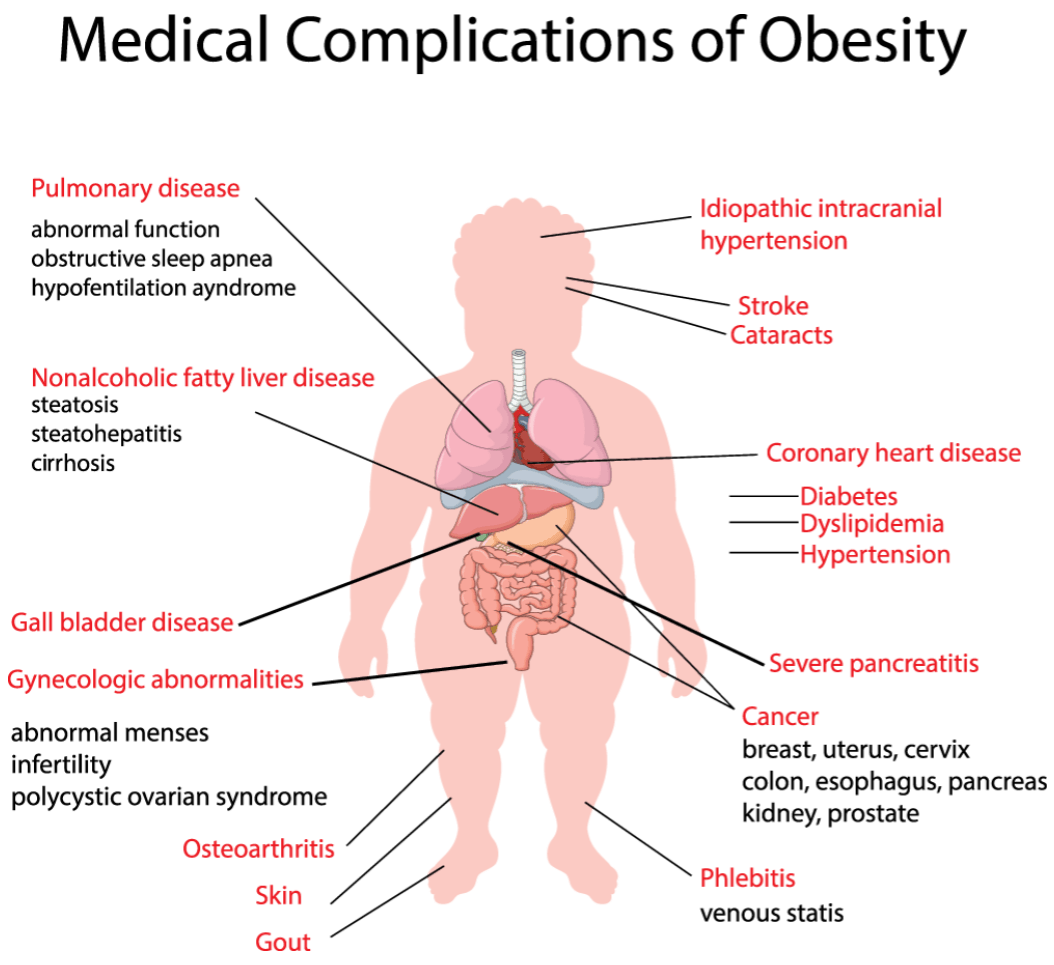Weight Management and Health Risks
Being overweight or Obese is related to many avoidable conditions and illnesses. Obesity is linked to:
- Early Death
- Chronic Illness
- Avoidable Diseases
- Risk of Cancer
To understand why you need the surgery please watch this video and take control of your health:
Health Improvements After Bariatric Surgery
Bariatric surgery has been shown to produce significant and sustained improvements in obesity-related conditions.
Cardiometabolic Benefits
- Type 2 Diabetes Remission:
- Roux-en-Y Gastric Bypass (RYGB): 60–80% remission rates (Arterburn et al., 2020)
- Sleeve Gastrectomy (SG): 50–70% remission (Schauer et al., 2017)
- HbA1c reductions of 2–3% within 6–12 months (Mingrone et al., 2015)
- Hypertension Resolution:
- >50% of patients discontinue or reduce antihypertensive medications (Sjöström et al., 2004)
- Systolic BP reductions of 10–15 mmHg (Adams et al., 2017)
- Dyslipidemia Improvement:
- 30–40% reduction in LDL cholesterol (Buchwald et al., 2004)
- 50% increase in HDL cholesterol (Ikramuddin et al., 2013)
Respiratory & Gastrointestinal Benefits
- Sleep Apnea Resolution: 74–85% of patients experience significant improvement or discontinuation of CPAP (Greenburg et al., 2009)
- GERD & Acid Reflux:
- 80–90% symptom resolution after RYGB (Katz et al., 2013)
- Variable outcomes with sleeve gastrectomy (depending on pre-existing GERD)
Musculoskeletal & Liver Health
- Osteoarthritis & Joint Pain: 30–50% reduction in knee/hip pain per 10% weight loss (Messier et al., 2018)
- Non-Alcoholic Fatty Liver Disease (NAFLD)
- >90% resolution of steatosis in patients with ≥10% weight loss (Lassailly et al., 2020)
- Fibrosis regression in 30–40% of cases (Bower et al., 2022)
Reproductive & Endocrine Benefits
- PCOS & Fertility:
- 60–80% of women regain regular menstrual cycles (Teede et al., 2018)
- 2–3x higher conception rates in previously infertile women (Best et al., 2017)
- Hormonal Balance: Leptin levels decrease, adiponectin increases, improving insulin sensitivity (Le Roux et al., 2011)
Neurological, Renal & Longevity Benefits
- Diabetic Neuropathy Improvement: 35–45% reduction in symptoms (Callaghan et al., 2016)
- Kidney Function: 40–60% reduction in microalbuminuria (Afshinnia et al., 2017)
- Mortality Risk Reduction: 40–50% lower 10-year mortality vs. non-surgical patients (Adams et al., 2017)
Psychological Benefits
- Depression & Anxiety:
- 40–50% reduction in depression symptoms (Dawes et al., 2016)
- 2.5x higher rates of anxiety remission vs. non-surgical patients (Jumbe et al., 2017)
- Quality of Life:
- 30–40 point improvement in SF-36 mental health scores (Kolotkin et al., 2019)
- 60–70% report improved body image (Sarwer et al., 2018)
Cancer Risk Reduction
- Overall Cancer Risk:
- 33% lower incidence in women (Schauer et al., 2017)
- 40% lower obesity-related cancer mortality (Aminian et al., 2021)
- Specific Cancers:
- Endometrial: 50–60% risk reduction (MacKintosh et al., 2019)
- Breast: 30–40% lower postmenopausal risk (Feigelson et al., 2021)
- Colorectal: 35% lower incidence (Schlesinger et al., 2020)









